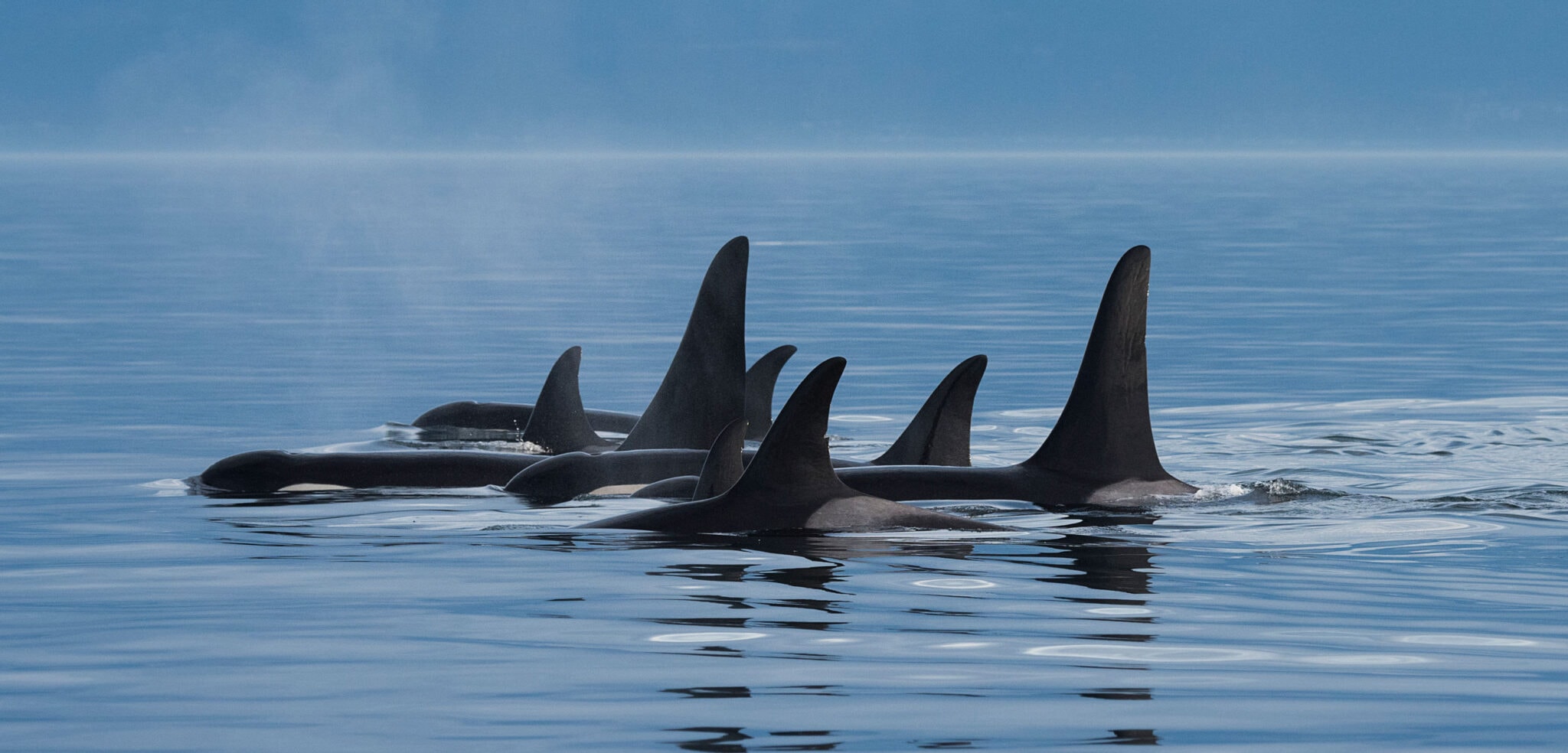
On both sides of the border, fishery and whale watching closures are necessary short-term actions to help recover an SRKW population in dire straits.
The David Suzuki Foundation (DSF) and Raincoast Conservation Foundation (RCF) issued a press release today urging an immediate closure of Chinook fisheries on B.C.’s coast and the closure of all whale watching as necessary actions to preserve Southern Resident Killer Whales (SRKW). Wild Fish Conservancy supports this call to action and is issuing a call for similar actions on the US side of the border. In support of this viewpoint, WFC drafted a set of bullet points that provides additional context for our support of our B.C. colleagues’ call for action.
“What DSF and RCF recommended today is the best scientifically defensible strategy for rapidly halting the shocking decline of SRKW in recent years. We need to immediately take actions that hold the greatest promise of halting the decline and stabilizing the SRKW population. These actions will also lay the foundation for rebuilding both SRKW and the Chinook populations on which they depend. It is now incumbent on managers on the US side of the Salish Sea to undertake similar and complementary actions to assure SRKW secure and untroubled access to the numbers of Chinook salmon required to stabilize population numbers during the months that they inhabit the Salish Sea and environs ,” said WFC Executive Director Kurt Beardslee.
Coastal marine mixed-stock salmon fisheries along the Washington Coast, the West Coast of Vancouver Island, and Southeast Alaska harvest adult Chinook returning to spawn in their rivers of origin in the Salish Sea before SRKW can encounter them in their summer feeding areas. These fisheries also encounter and kill younger, immature Chinook feeding in coastal waters one to four years before they would mature and return to spawn, thereby impairing the ability of depressed Chinook populations to rebuild to sustainably harvestable numbers.
By significantly reducing, if not eliminating, commercial and recreational fisheries targeting Chinook in coastal ocean mixed stock fisheries, Chinook populations critical to foraging SRKW will have a greater probability of returning to waters inside the Strait of Juan de Fuca where SRKW’s do the majority of their foraging from early spring to early fall. This will also result in more mature Chinook returning to areas near their rivers of origin after SRKW have had a fair opportunity to forage on them, resulting in increased spawning escapements of depressed Fraser River and Puget Sound populations.
Foraging refuge areas have been identified in BC and include the Southwest side of Vancouver Island from Barkley Sound (including Swiftsure Bank) to the entrance of the Strait and from the entrance to the Strait to Sooke Inlet, Haro Strait, and the approaches to the Fraser River. On the US side, the south and west side of San Juan Island has been identified as a critical refuge area. Additional refuge areas in North Puget Sound within currently designated critical habitat remain to be identified and should be a high priority for US managers in the immediate future. Refuge areas are designed to assure killer whales first access to Chinook and other prey fishes, and to secure the whales relief from the vessel noise created by whale watching and fishing boats that disrupt feeding behavior.
The proposed closures of coastal ocean mixed-stock Chinook fisheries will also result in more Chinook being available to foraging SRKW during the months of October to April when the whales are largely absent from the Salish Sea while they forage in coastal areas from southern B.C. to northern California, and will also contribute to rebuilding runs of depressed Columbia River spring Chinook salmon which are a significant winter prey of SRKW.
In contrast to current questionable proposals to increase the production of hatchery Chinook to help SRKW, which are unlikely to help the whales and will impose additional harm on depressed wild Chinook stocks, the actions we and our B.C. colleagues propose positively support the stabilization of the SRKW and will also facilitate the rebuilding of the critical Chinook stocks on which they depend.
WFC is well aware of the challenges such closures will present to the tribal and non-tribal commercial and sports fishers and the commercial whale watching industry. “Unfortunately,”, Beardslee noted, “the time has come when all have to pay for the mismanagement of Chinook salmon on both sides of the border if we are to fulfill our obligation to future generations in preserving the legacy of Salish Sea killer whales.”
###
Contact Information
Kurt Beardslee, Executive Director, Wild Fish Conservancy, Phone: 425-788-1167, [email protected]